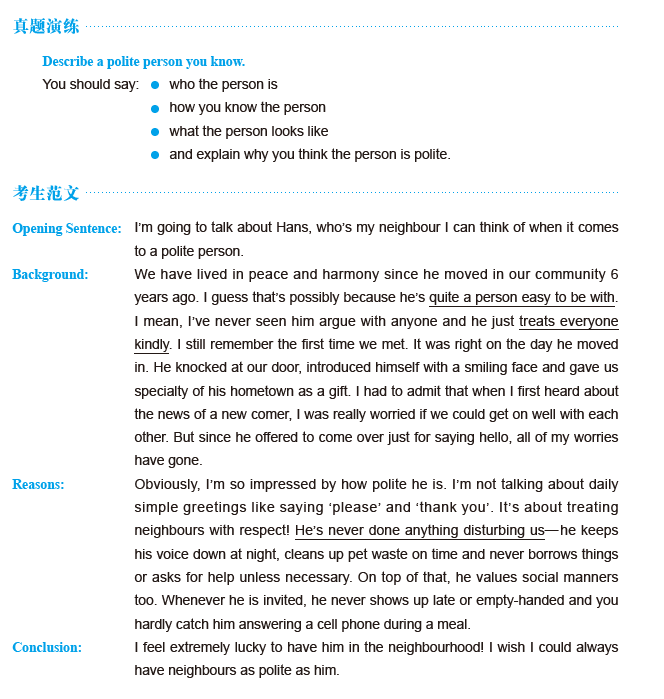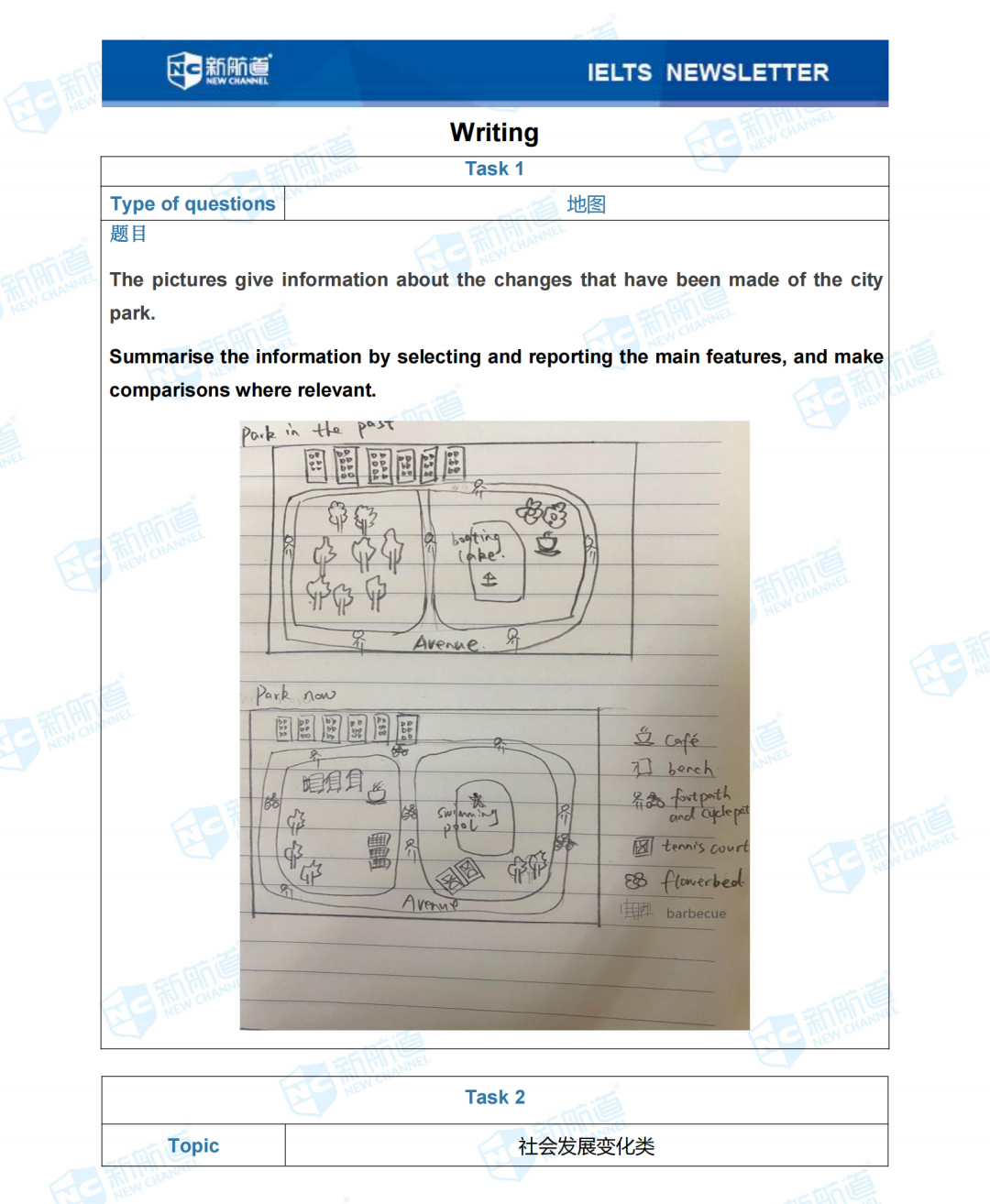新航道2021年6月19日雅思考试机经完整版
每场雅思考试之后,
分享本场A类雅思考试的参考回忆及解读
2021/6/19 Saturday
各位烤鸭
6月19的雅思考试回忆来啦!
本次雅思考试《九分达人》系列图书
又中一题
听力Part 2
"Describe a person you know who is polite"
对应《九分达人雅思口语真题还原及解析2》
"Describe a polite person you know"

2021.06.19
LISTENING
PART 1
Version
Topic
旧题
一女求兼职工作,一男询问个人信息、工作经历以及工作时间
1-6为填空题
Children's library
Name:
Teresa Scholes
Address: 1. Acacla Avenue
Area:
Hessingham
Code:
2. BAS7AU
Date of birth: 28, February 1971
Degree: 3. photograph
Job experience

7-10为填空题
A Yes, definitely
B Possibly
C No, definitely not
7. weekends
A 提示词: saturday or Sunday; like, often
8. after7 p.m.
C 提示词: turn down
9. holidays
A 提示词: favorite time
10. lunchtimes
B 提示词: leave it flexible
PART 2
Version
Topic
旧题
Green island澳洲旅游
11-16为选择题
Location
Australia
Transportation
Tourists can only go there by 11. boat
Climate
Weather is humid, temperature is 12. rmild
Museum
The famous display objects in the museum exhbtion are loaned from 13. UK
Things to do
Whale-watching costs$ 14. 50
Riding 15. bikes (you can hire bikes at Waterfront)
There are four types of garden
There is sunken garden.16. rose garden, Japanese garden, you can have a dinner and
watch the views at the same time.
17-20为匹配题
Options are:
A apartment hotel
B backpack
C executive
D family
E long-term rent
F luxury
17. H* hotel: F luxury
18. H**hotel: D the family
19. Sin***hotel: E long-term rents
20. ***heaven:
B backpack
PART3
Version
Topic
旧题
Battery powered motorbike
21-26为选择题
21. What do they have to do for this assignment?
B. to attract more potential students
22. What is the specialty of this motorbike?
A. it is faster than the original model
23. Why is this project presentation difull
C. they do not have enough time to prepare it
24. How to start next step?
B. with a video clip
25. What should be put in nest presentation?
C. with diagrams information
26. What should they do next in the aftermoon?
B. ask and discuss with other students after lunch
27-30为匹配题
27. reference report: A. longer than expected
28. logbook: D. get help from a relative
29. writing sketchbook: F. other groups got wrong result
30. looking for sponsor; B. surprisingly enjoyable
PART4
Version
Topic
新题
Simo valley dam
31-40为填空题
Background:
200m, 31.major dam
Function:
Air qualily
can help stop 32 flooding
Negative effect:
●*ofthedam
33.unusual plants need to be removed.
34. the Goats' ..pattem of migration
35. decrease in the amount of specles of fish (because of the temperature of the river )
●*ofthedam
36. changed the farming on irrigation system
37. the mouth of river.. erosion (Because of the increase of the flows peed.)
38. oxygen
●near the dam
39. has high quality of salt
Positive effect:
improve air quality
40. More iobs provided for residents
SPEAKING
Part 1
People & Animal
Wild life
Events
Extreme sports
Barbecue
Holiday
Watch stars
Environmental Protection
Relax
Car trip
Work & study
Sing
Reading
Getting up earty
Objects & Things
Wallet and purse
Special costumes
Farming
Window View
Places
Hometown
Home County
Accommodation
Primary School,
Room
Museum
Abstract
Advertisement
Being happy
Names
New Year
Part 2&3
People & Animal
Describe your favorite singer or actor喜欢的歌手或演员
Describe a person who loves to do social work社会工作
Describe a writer you would like to meet作家
Describe a person who understands your felings and emotions懂你的人
Describe a person who you think wears unusual clothes穿着奇怪的人
Describe someone who is older than you that you admire尊敬的长者
Describe a person who likes to help others乐于助人
Describe a person you know who is polite礼貌的人
Events
Descibe an argument vith your friend与朋友的争吵
Describe a time when you helped a friend帮助朋友的经历
Describe a time when you lost your way迷路
Descibe an occasion when many people were smiling微笑
Describe an occasion when you were not alowed to use your mobile phone不允许用手机的场合
Describe an event when you tried to do something but not successul.努力做了但没有成功的事
Describe a plan in your life (that is not related to work or study计划
Describe a leisure activity near/ on the sea that you want to try水上活动
Describe time when you shared something with others (or another person)分享
Describe an occasion when you ate something for the frst time第%一-次吃某种东西
Describe a time when you made a promise to someone承诺
Describe a live sport match that you have watched现场体育比赛
Describe a time you had to wait in line for a long time排长长的队
Describe a time you had to encourage someone to do something he or she didn't enjoy doing鼓励别人做不喜欢的事情
Describe a time when it is important to tell your friend the truth告诉朋友事实
Describe a time when you had to use your imagination用想象力
Describe an activity that you do after schol/work课后活动
Objects/Things
Describe a piece of equipment that is the most important one in your family 家中重要的设
Describe a natural talent (like sports, music and so on) you want to improve提高的天赋
Describe a puzzle(like a jigsaw or a Cross word) you have solved谜语
Describe an art or craft activity (e.g. painting. woodwork, etc.) that you had (at school)艺术品
Describe an article on health you have read.关于健康的文章
Describe a toy you enjoyed playing when you were a kid.小时候喜欢的玩具
Describe a thing that you bought and felt pleased about. 满意的购物
Places
Describe a town or a city where you would like to live in the future想居住的城镇
Describe a tall building in your city you like or dislike高楼
Describe a place you visited that has been afected by pllution污染的地方
Describe a quiet place you like to spend your time in安静的地方
Describe a place (not your home)where you are able to relax放松的地方
Describe a part of a city or town that you enjoy spending time in.喜欢的地方
Describe someone's home you like but don't want to live in.不喜欢的家
Describe a street market or outdoor market you've beento街边集市
Describe a company where you live that employs a lot of people大公司
Abstract
Describe your favorite movie喜欢的电影
Describe a piece of local news that people are interested in本地新闻
Describe a law on environmental protection环保法律
Describe a time when you found out something interesting on the social media在社交媒体的趣事
Describe a skill that you think you can teach other people.教别人技能
Describe a perfect job you would like to have完美的工作
READING
Passage 1
Topic
History of coffe
Coffle grown worldwide can trace its heritage back centuries to the ancient coffee forests on the Ethiopian plateau. There, legend says the goat herder Kaldi first discovered the
potential of these beloved beans. The story goes that that Kaldi discovered coffee after he noticed that after eating the berries from a certain tree, his goats became so energetic that they did not want to sleep at night.
Kaldi reported his findings to the abbot of the local monastery, who made a drink with the berries and found that it kept him alert through the long hours of evening prayer. The abbot
shared his discovery with the other monks at the monastery, and knowledge of the energizing berries began to spread.
As word moved east and coffee reached the Arabian peninsula, it began a joumey which would bring these beans across the globe.
Coffee culivation and trade began on the Arabian Peninsula. By the 15th century, coffee was being grown in the Yemeni district of Arabia and by the 16th century it was known in
Persia, Egypt, Synia, and Turkey.
Coffe was not only enjoyed in homes, but also in the many public coffee houses called qahveh khaneh - which began to appear in clties across the Near East. The popularity of the coffee houses was unequaled and people frequented them for all kinds of social actlvity.
Not only did the patrons drink coffee and engage in conversation, but they also listened to music, watched performers. played chess and kept current on the news. Coffee houses
quickly became such an important center for the exchange of information that they were often referred to as“Schools of the Wise."
With thousands of pilgrimns visiting the holy city of Mecca each year from all over the world, knowledge of this "wine of Araby" began to spread.
European travelers to the Near East brought back stories of an unusual dark black beverage. By the 17th century, coffee had made its way to Europe and was becoming
popular across the continent.
Some people reacted to this new beverage with suspicion or fear, calling it the “bitter invention of Satan." The local clergy condemned coffee when it came to Venice in 1615.
The controversy was so great that Pope Clement ViII was asked to intervene. He decided to taste the beverage for himself before making a decision, and found the drink s
satisfying that he gave it papal approval.
Despite such controversy, coffee houses were quickly becoming centers of social activity and communication in the major cities of England, Austria, France, Germany and Holland.
In England "penny universities" sprang up, so called because for the price of a penny one could purchase a cup of coffee and engage in stimulating conversation.
Coffee began to replace the common breakfast drink beverages of the time一beer and wine. Those who drank coffee instead of alcohol began the day alert and energized, and
not surprisingly. the quality of their work was greatly improved. (We like to think of this a precursor to the modem oflice coffee serice.)
By the mid-17th century, there were over 300 coffee houses in London, many of which attracted like-minded patrons, including merchants, shippers, brokers and artists.
Many businesses grew out of these specialized coffe houses. Lloyd's of London, for example, came into existence at the Edward Lloyd's Coffee House.
In the mid-1600's, coffee was brought to New Amsterdam, later called New York by the British.
Though coffee houses rapidly began to appear, tea continued to be the favored drink in the New World until 1773, when the colonists revlted against a heavy tax on tea imposed by
King George II The revolt, known as the Boston Tea Party, would forever change the : American drinking preference to offe.
As demand for the beverage continued to spread, there was ferce competition to cultivate coffee outside of Arabia.
The Dutch finally got seedlings in the ltter half of the 17th century. Their frst attempts to plant them in India failed, but they were successful with their efforts in Batavia, on the
island of Java in what is now Indonesia.
The plants thrived and soon the Dutch had a productive and growing trade in offee. They then expanded the cultivation of coffee trees to the islands of Sumatra and Celebes.
In 1714, the Mayor of Amsterdam presented a git of a young coffee plant to King Louis XIV of France. The King ordered it to be planted in the Royal Botanical Garden in Paris. I
1723, a young naval oficer, Gabriel de Clieu obtained a seeding from the King's plant.
Despite a challenging voyage - complete with horrendous weather, a saboteur who tried to destroy the seedling, and a pirate attack - he managed to transport it safely to
Martinique.
Once planted, the seedling not only thrived, but it's credited with the spread of over 18 million coffee trees on the island of Martinique in the next 50 years. Even more incredible is
that this seedling was the parent of all coffee trees throughout the Caribbean, South and Central America.
The famed Brazilian coffe owes its existence to Francisco de Mello Palheta, who was sent by the emperor to French Guiana to get coffee seedlings. The French were not wlling
to share, but the French Govemor's wife, captivated by his good looks, gave him a large bouquet of flowers before he left- buried inside were enough coffee seeds to begin what
is today a bllin-dollar industry.
Missionaries and travelers, traders and colonists continued to carry coffee seeds to new lands,and coffee trees were planted worldwide. Plantations were established in
magnificent tropical forests and on rugged mountain highlands. Some crops flourished, while others were shot-lived. New nations were established on coffee economies.
Fortunes were made and lost. By the end of the 18th century, coffee had become one of the world's most profitable export crops. After crude oil, coffee is the most sought
commodity in the world.
1-6为填空题
1.goats
2.monastery
3.companies
4.king
5.flowers
6.tea
7-13为判断题
暂无
Passage 2
Topic
The differences between youth soccer and street soccer in USA
14-19为匹配题
14 a contrast between street soccer and youth soccer on different positions E
15 an incident that led to increasing concerm of safety issues C
16 the difference on the ways to decide the leadership
17 unban changes that led to reduction of street soccer
18 a lesson that a failure teaches in the street soccer
19 the reason why people think a coach is necessary in playing soccer D
20-23为多选题
20-21 C E
22-23 D E
24-26为填空题
Freedom is the main concemn of playing soccer. Players in the youth team have a 24
principle that they need to have a postive atitude. So after the game they receive the
same 25 reward no matter what they have achieved in the game.
There is another difference between youth soccer and street soccer. Although street
soccer emphasizes score, they will not keep the 26 record after the game.
Pasage3
Topic
Facial expressions
A. That verbal language did not work proper.
B. Mimic other's behavior
C. Cooperation makes the task harder
D. Lack of cooperation will cause anger
E. Know the task and have a dlear view
F. Depend on whether or not the task is shared.
G. We cooperate people that we do not know.
27-32为匹配题
27 driving car is a situation G
28 dancing with partner is a sitation A
29 model making E
30 feling of exclude was involved in a situation B
31 computer experiment C
32 the weight of boxes F
33-34为选择题
33 Watch the film of ballet and Capoeira
A the dancer fllow the movement in the flm
B the dancer compare the movement in the flm and what they do
C the same pattem of the brain
D the same reaction of area
34 In a survey by Natalie,the subject
A influenced by factor that they are told to ignore
B has to distinguish the color green and red
C differ from left handed and right-handed
D ifluenced by the time in hand
35-40为判断题
35.The trivial cooperation should use polite language↓(NOT GIVEN)
36. Human alter the grammar to mirror other people. (YES )
37. People failed to follow the instruction will make the task time longer. (YES)
38. Copying other people's behavior is interpreted a kind of aggression. (NO)
39. In the computer experiment, the subject disrespect the action. (NO)
40. Human cooperation is instinctive rather than conscious. (YES)











